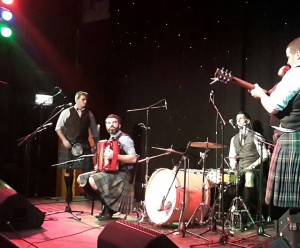Stories from Scotland (Part 1): Coffee and Bagels vs. Tea and Biscuits
Did you know that more than 40 percent of Gordon students study abroad at some point during their four years? Business administration major Chan Mi Kim ’16 is one of them. Having lived in Korea, Vietnam and Malaysia—and traveled extensively during a gap year before coming to Gordon—Chan Mi is no stranger to the global community. This summer, she’s bringing a three-part series on her recent study abroad experience in Scotland to The Bell.
Sometimes an airplane takes me to unexplored places. Three years ago, it took me to a country of “cawfee” and bagels—the U.S.—and six months ago to a country of tea and biscuits, where I started my semester abroad in Edinburgh, Scotland, U.K. I landed in Edinburgh in early January when the weather was as fickle as a seven-year-old in a candy shop. Despite th e bad weather, I was captivated at first sight. Between the narrow streets lined with quaint shops and pubs are the cobblestone roads that take you to medieval architecture with occasional hidden passages. Edinburgh is the capital of Scotland, birthplace of Harry Potter, and the city of bagpipes and kilts. I never thought men in skirts could be attractive, but oh, my! If you go to a Scottish ceilidh (Scottish version of line dancing) you’ll have a mighty good time spinning with charming Scottish men in kilts to bag-pipe country music. Oh, the Scottish culture is rich!
e bad weather, I was captivated at first sight. Between the narrow streets lined with quaint shops and pubs are the cobblestone roads that take you to medieval architecture with occasional hidden passages. Edinburgh is the capital of Scotland, birthplace of Harry Potter, and the city of bagpipes and kilts. I never thought men in skirts could be attractive, but oh, my! If you go to a Scottish ceilidh (Scottish version of line dancing) you’ll have a mighty good time spinning with charming Scottish men in kilts to bag-pipe country music. Oh, the Scottish culture is rich!
The U.S. and the U.K. are even more different than I expected. Apart from the obvious, did you know that “pudding” means dessert in the U.K.? Once, a friend told everyone to bring a pudding for a party, and I almost gagged at the thought of a room full of pudding. Fortunately she meant dessert, not 12 different flavors of jelly mush. The most different of all, however, is the educational system of the U.K. Let me share a little bit about that.
No textbook, no assignment, no teacher
Gordon College is a Christian liberal arts school, whereas the University of Edinburgh is a big and secular research school. The biggest difference I noticed was that learning comes from research rather than study, and learning is much more individualistic and self-managed in the U.K. All of my lectures were basically professors giving an overview of the topic. Then outside of the class, I chose from a reading list the papers that interested me the most. Every student was free to choose what and how much to learn. I also didn’t need to buy a single textbook or turn in any assignments. There may be a paper or two, depending on the course, but most of the grade comes from the final exam. For my “Social Anthropology” course, there were two questions on the final exam—and that accounted for 80 percent of my grade.
Another shock came when I got my first paper back with a six as the first digit in the grade. I was about to run to the bathroom and cry, but thankfully, in the U.K. 60s are actually a B. A passing grade is 40, and the majority of the students get a grade somewhere between 60 and 70. In some colleges, a score above 80 will get your paper published in an academic journal. I got a wide range of grades this semester, but mostly, I was able to excel in my classes. I can definitely say that Gordon prepared me well even for a top-ranking university.

I am confident that my semester in Edinburgh will go a long way in preparing me for life after Gordon. It has taught me to how to learn on my own (where to go for sources, systems of citation, and discerning the integrity of a particular paper), and helped me discover my newfound interest in research. It also confirmed my future career direction in international development. If Gordon has given me great overview and big picture of international development, Edinburgh helped to refine my niche to a more specific field.
Stories from Scotland (Part 2): Soul Searching and C. S. Lewis’ Grave >>
Stories from Scotland (Part 3): Tips for Traveling Europe like a Traveler, Not a Tourist >>
 The Bell
The Bell